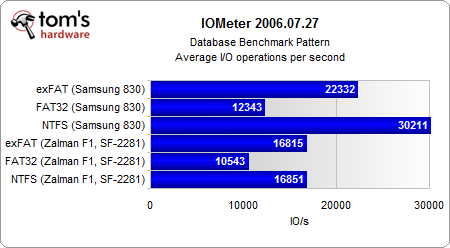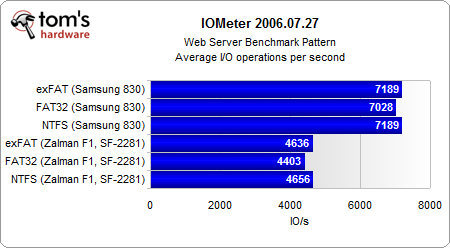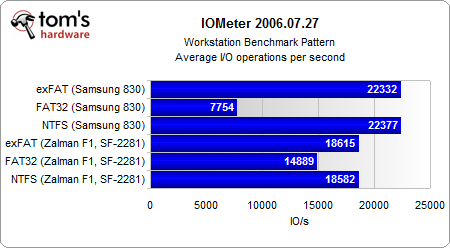Does Your SSD's File System Affect Performance?
SSDs serve up data quickly, and prices are low enough that some enthusiasts may want SSDs for data storage. Does the file system you use matter? We compare performance between FAT32, NTFS, and the newer exFAT file systems on two popular SSD architectures.
Benchmark Results: Iometer Workload Tests
The database test is a completely random set of operations, of which 67% are reads. It works with 8 KB block sizes, on which NTFS can capitalize on the non-compressed Samsung architecture, while the SandForce-based drive performs similarly on NTFS and eFAT. FAT32 is barely worth noting here.
The Web server workload does not execute writes, so it delivers similar performance across all the file systems.
The workstation workload patterns split read and write operations 80/20% respectively, with random and sequential operations also split 80/20%. It involves block sizes of 64, 128, and 256 KB, which is why FAT32 shows performance limits again, since it does not support blocks that large.
Get Tom's Hardware's best news and in-depth reviews, straight to your inbox.
Current page: Benchmark Results: Iometer Workload Tests
Prev Page Benchmark Results: Iometer 4 KB Random And Streaming Read/Write Next Page Benchmark Results: PCMark 7
Patrick Schmid was the editor-in-chief for Tom's Hardware from 2005 to 2006. He wrote numerous articles on a wide range of hardware topics, including storage, CPUs, and system builds.
-
neon neophyte I remember the crossing from Fat32 to NTFS. It was significant even back then. Ever since I have craved a new file system offering to rekindle a fading memory of youth and joy. *sniff*Reply -
aicom hmp_gooseReply
NTFS was heavily based on HPFS (when MS and IBM were both working on OS/2). It even shares the same MBR partition type code.
-
billafu Enjoyed the article. Sadly, I am still unable to justify spending nearly a dollar per gigabyte for an SSD when HDDs are less than a dime per gig. Maybe when that price difference is a little bit closer.Reply -
billafuEnjoyed the article. Sadly, I am still unable to justify spending nearly a dollar per gigabyte for an SSD when HDDs are less than a dime per gig. Maybe when that price difference is a little bit closer.120gb for a 120$ and HUGE performance increase and you still complain? How about you get a job.Reply


